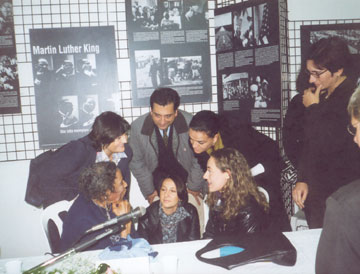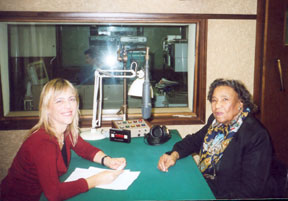
Highlights | Calendar | Music | Books | Concerts | Links | Education | Health
What's New | LaRouche | Spanish Pages | Poetry | Maps
Dialogue of Cultures
Amelia Robinson Brings Peace and
Development Message to Italy
 |
||||
| Amelia Robinson during here Italian Tour, shown here at an exhitition in Lari (Pisa) |
||||
"But this time, it was quite rewarding to me, to see and converse with such well-informed people, who are just citizens with no discovered ability to lead, though politically well-informed; to talk with students, who gave me the courage to continue to give whatever wisdom I have as I travel over the highway of time. The highlight was the meeting and conversing with diplomats, parliamentarians, and heads of political organizations, which brightened every conference or meeting I had with them."
Mrs. Robinson said that her "wish for this country (and others, too), is that they continue to work towards freedom and justice for all human beings, as we are all God's children, and we are brothers and sisters. Regardless of the future, God will make a way out of no way."
In-Depth Discussions
Mrs. Robinson began her trip Nov. 12, at a conference organized by the Methodist Church in Rome and chaired by Paolo Naso, director of the magazine Confronti, on the role churches should play to stop the war on Iraq and the "Clash of Civilizations." Asked repeatedly about the Nov. 5 elections and the role of the Democratic Party in the U.S., she spoke at length about LaRouche's role in reviving the party in the tradition of Franklin Roosevelt, in opposition to the party's national leadership, which considers itself a "private club," free to "nullify the Voting Rights Act of 1965."
Mrs. Robinson was interviewed by Italian national television Rai Due, in its transmission "Protestantism," which will be aired on the birthday of Martin Luther King. The second channel of Rai Due also interviewed her.
She spent two lively hours with 80 students of languages and literature at the State University "La Sapienza" in Rome, whose teacher had interviewed her in September for the Italian daily Il Manifesto; later in her visit, she addressed the Faculty of Political Sciences at the university.
The next day, Mrs. Robinson was received officially at the International Fund for Agricultural Development, a UN-connected organization representing 80 nations, at an official lunch with its leadership and a public meeting with its 80-person staff. They welcomed her strong call against the war and for economic cooperation, with a standing ovation. In the afternoon she spoke at the Casa delle Donne (House of Women), which hosts 12 women's organizations; there she was introduced by Marguerite Lottin from Cameroon, who represents the Intercultural Center Griot in Rome.
'Month for Peace'
On Nov. 15, Mrs. Robinson was officially received by the Mayor of Lari (Pisa) and two other mayors of the Tuscany region, for their "month for peace." She spoke at Lari schools, and at a meeting of 200 citizens of Tuscan cities, organized by the Lari Buddhist Center. The center was celebrating "three men of peace": Mahatma Gandhi, Martin Luther King, and the Buddhist leader Ikeda. There, the regional radio interviewed Mrs. Robinson, Marguerite Lottin, and Bruno Raimondi, president of LaRouche's Civil Rights Movement Solidarity in Italy.
On Nov. 17, Mrs. Robinson moved on to the nearby Republic of San Marino, an ancient independent republic still governed by two "Capitani Reggenti," Captains Regent representing two opposing political factions, governing together, according to an ancient Renaissance tradition, to avoid a dictatorship. They received her with all honors in the ancient government palace, thanking her for her campaign for peace and for LaRouche's program to rebuild the world economy. San Marino's Minister for Culture displayed the most important paintings and statues of the government palace, including a statue of Abraham Lincoln, who wrote a letter to the Republic during the Civil War. San Marino government TV ran a report about Mrs. Robinson's visit on its prime-time news, under the headline "Angel of Rights."
In Rome Nov. 18-19, Mrs. Robinson held a joint press conference with the "Civil Disobedients," an organization
which fights globalization and the Iraq war, which asked her advice. She told them about Dr. King's fight for non-violence, and his efforts to identify and expel from the movement infiltrators and provocateurs who had been planted by the FBI in order to provoke clashes with the state troopers of Gov. George Wallace.
Just before the press conference, she addressed a packed meeting of students at the most famous secondary school of Rome, the Liceo Giulio Cesare, with 80 enthusiastic youth 16-18 years of age, who listened to her story with tears in their eyes. When one angry young man expressed doubts about the efficiency of non-violence, Mrs. Robinson responded by telling how hate destroys the hater rather than the hated, and stressing that dialogue is the only way to solve problems in the family as in politics. The students greeted her with a standing ovation. |
||||
| Mrs. Robinson being interviewed by Vatican Radio for it's English language program. |
||||
Before leaving Italy, she was also interviewed by Vatican Radio.
Historic Video
Continuing to make history back home in Tuskegee Institute, Ala., Mrs. Robinson was interviewed Dec. 16, 2002, by the National Visionary Leadership Project of Washington, D.C.
The Project was founded last year by Camille Cosby, educator, philanthropist, and wife of comedian Bill Cosby, to preserve, on videotape and through widespread exposure on college campuses, the lives and contributions of the leading Americans of African descent who are now over 70 years old. Each year, 30 leaders are interviewed: Besides Mrs. Robinson, the project has interviewed Maya Angelou, Edward Brooke, Ray Charles, Shirley Chisholm, Ossie Davis, Ruby Dee, David Dinkins, Dick Gregory, Dorothy Height, Coretta Scott King, Andrew Young, Fred Shuttlesworth, and others.
The interview, conducted by executive director and veteran network journalist Renee Poussaint, will be posted to the Project's website, www.visionaryproject.com. It will also be part of campus-based conferences aimed at giving the next generation of black Americans a hands-on introduction to some of America's black leaders, and will be made part of TV-quality tapes for broader dissemination.
Mrs. Robinson focussed in the three-hour interview on her lifelong quest for justice and human rights, which led her first to Dr. King, and then to Lyndon LaRouche, whose literature she displayed before the camera. She called attention to the promise of LaRouche's international youth movement, which, she said, is the "only way the whole world can defeat the evil which is engulfing it now." Noting the recent TV coverage of Democratic Party Presidential contenders, which never mentions Lyndon LaRouche, she said they do this because "evil is afraid of good, because he pulls the hood off of corruption."
Amelia Boynton Robinson Honored in Italy, September, 2002
90th Birthday Celebration: "Her Love is a Higher Power" (2001)
91st Birthday and Ceremony "Boynton Weekend in Selma, Alabama" (2002)
Biography of Amelia Boynton Robinson
Dialogue of Cultures Visit to Iran, June 2002
"Bridge Across Jordon " Autobiography (Sorry, out of print in English)
schiller@schillerinstitute.org
The Schiller Institute
PO BOX 20244
Washington, DC 20041-0244
703-297-8368
Thank you for supporting the Schiller Institute. Your membership and contributions enable us to publish FIDELIO Magazine, and to sponsor concerts, conferences, and other activities which represent critical interventions into the policy making and cultural life of the nation and the world.
Contributions and memberships are not tax-deductible.
VISIT THESE OTHER PAGES:
Home | Search | About | Fidelio | Economy | Strategy | Justice | Conferences | Join
Highlights | Calendar | Music | Books | Concerts | Links | Education | Health
What's New | LaRouche | Spanish Pages | Poetry | Maps
Dialogue of Cultures
© Copyright Schiller Institute, Inc. 2002. All Rights Reserved.